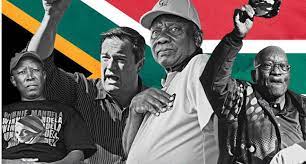The African National Congress (ANC) stands at a crossroads following South Africa’s historic May 29 elections, tasked with the unenviable task of forging a coalition with some of its sworn enemies to ensure it maintains its governing mandate.
After failing to win an absolute majority of the votes for the first time since independence in 1994, the party of Nelson Mandela finds itself enmeshed in a complex political puzzle in which its very existence and future depends on the kind of marriage it will forge with various potential political suitors, each bringing their own ideologies and demands to the table.
The ANC’s primary challenge is securing a parliamentary majority. With only 40 percent of the vote secured during last week’s poll, the party’s options include aligning with the centre-right and pro-business Democratic Alliance (DA) or radical breakaway factions like the Economic Freedom Fighters (EFF) and uMkhonto weSizwe (MK).
“Aligning with the DA could be seen as a betrayal of the ANC’s core constituency and a reinforcement of apartheid-era economic structures,” notes political analyst Donald Porusingazi.
Critics – including combative EFF leader Julius Malema – accuse the DA of protecting the economic privileges of South Africa’s white minority. The party denies the charge.
Another sticking point in the ANC-DA coalition talks is expected to be the former’s commitment to welfare state policies, which clash with the DA’s free-market approach.
Porusingazi says while partnering with the EFF or MK will align with the ANC’s traditional base, it will, however, introduce policy friction, particularly around land expropriation and constitutional reforms.
The EFF and MK advocate similar economic policies, including the expropriation of white-owned land without compensation and nationalisation of key sectors of the economy, while the ANC wants an orderly land reform programme.
Another potential challenge in any coalition talks between the ANC and MK, whose public face is former South African president Jacob Zuma, will be over the latter’s demand for a new election following what it claims were irregularities in the vote last Wednesday.
Media reports have also indicated that Zuma’s party has set the removal of Ramaphosa from the ANC presidency as a precondition for any coalition talks – a condition dismissed by ANC secretary general Fikile Mbalula at the weekend.
Whatever the eventual outcome of the unity government talks, the ANC has its work cut out for it and has a tricky couple of days to navigate its ideological differences with its opponents in order to survive.
“The bottom-line is that, at the back of its mind, ANC strategists should target an outcome that allows the party to survive and fight another day,” Porusingazi says.
The outcome of these negotiations will, therefore, set the course for South Africa’s future governance and policy direction.
JN/APA


